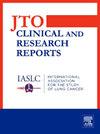A Phase II Study of Cabozantinib in Patients With MET-Altered Lung Cancers
IF 3.5
Q2 ONCOLOGY
引用次数: 0
Abstract
Introduction
Only type I MET tyrosine kinase inhibitors (TKIs) are approved for treating MET-altered NSCLCs. Preclinically, type II TKIs, such as cabozantinib, can rescue progression on type I TKIs. This phase 2 trial (NCT01639508) evaluated the activity of cabozantinib in patients with MET-dependent lung cancers, including TKI-pretreated cancers.
Methods
This phase 2 trial with a Simon two-stage minimax design treated patients with metastatic, MET-altered lung cancers with cabozantinib (60 mg daily) until progression or intolerable toxicity. The primary end point was objective response rate (ORR). We prespecified that cabozantinib would be considered a useful agent if at least a 20% ORR was observed. Secondary end points included progression-free survival, overall survival, and safety.
Results
We enrolled 28 patients, 23 patients (82%) with only a MET exon 14 alteration, two patients (7%) with MET amplification, and three patients (11%) with concurrent MET exon 14 alteration and amplification. There were 24 patients (86%) previously treated with a type I MET TKI. The ORR was 20% (5/25 assessable patients; 95% confidence interval [CI]: 8.9%–39.1%), with five partial responses (duration ranged from 4 to 39 mo). Four of five responders were type I MET TKI pretreated. The median progression-free survival and overall survival were 4.5 (95% CI: 3.3–5.7) months and 7.2 (95% CI: 2.9–11.5) months, respectively. Dose modification and discontinuation occurred in 64% (18/28) and 7% (2/28) of patients, respectively.
Conclusion
This trial met its primary end point. Importantly, we demonstrated that cabozantinib, a type II MET TKI, could benefit patients with MET-altered lung cancers previously treated with type I MET TKIs.
卡博赞替尼治疗met改变肺癌的II期研究
只有I型MET酪氨酸激酶抑制剂(TKIs)被批准用于治疗MET改变的非小细胞肺癌。临床前,II型TKIs,如卡博赞替尼,可以挽救I型TKIs的进展。这项2期试验(NCT01639508)评估了cabozantinib在met依赖性肺癌患者中的活性,包括tki预处理的癌症。方法:该2期临床试验采用Simon最小最大两期设计,使用卡博赞替尼(60mg /天)治疗转移性、met改变的肺癌患者,直至出现进展或无法忍受的毒性。主要终点为客观缓解率(ORR)。我们预先规定,如果观察到至少20%的ORR,卡博赞替尼将被认为是有用的药物。次要终点包括无进展生存期、总生存期和安全性。结果我们纳入了28例患者,23例(82%)患者只有MET外显子14改变,2例(7%)患者有MET扩增,3例(11%)患者同时有MET外显子14改变和扩增。有24名患者(86%)曾接受过I型MET TKI治疗。ORR为20%(5/25可评估患者;95%可信区间[CI]: 8.9%-39.1%), 5例部分缓解(持续时间从4至39个月不等)。五个应答者中有四个是I型MET TKI预处理。中位无进展生存期和总生存期分别为4.5 (95% CI: 3.3-5.7)个月和7.2 (95% CI: 2.9-11.5)个月。剂量调整和停药分别发生在64%(18/28)和7%(2/28)的患者中。结论:该试验达到了其主要终点。重要的是,我们证明了cabozantinib(一种II型MET TKI)可以使先前接受I型MET TKI治疗的MET改变的肺癌患者受益。
本文章由计算机程序翻译,如有差异,请以英文原文为准。
求助全文
约1分钟内获得全文
求助全文
来源期刊

JTO Clinical and Research Reports
Medicine-Oncology
CiteScore
4.20
自引率
0.00%
发文量
145
审稿时长
19 weeks
 求助内容:
求助内容: 应助结果提醒方式:
应助结果提醒方式:


